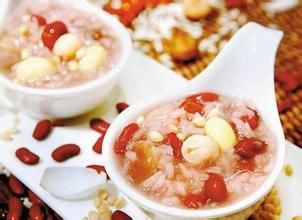双语知识夹:你知道腊八节的来历么(图)
 你知道腊八节的来历么
你知道腊八节的来历么The Laba Festival is a traditional Chinese holiday celebrated on the eighth day of the twelfth month of the lunar Chinese calendar. "La" is the name given to the 12th lunar month and 8 is pronounced as "ba" in Chinese, which translated is "Laba." There are several legends about the origin of this festivity and we could not tell which one is true. But what we know today is that this festival started as a sacrificial offering to ancestors. It was also a time for the ancient Chinese to pray to heaven and earth that there would be a bountiful harvest. Many people hoped for good luck as well for the coming year.
农历十二月初八是中国的传统节日——腊八节,腊代表中国农历的十二月,而八是eight的发音,因此,这个节日被翻译成腊八。关于腊八起源的传说有很多,我们已经不能辨其真假。时至今日,我们确定的是这个节日起初是为了祭祀祖先,祈求丰收以及为即将来到的一年祈福。
Traditionally, the Laba rice porridge is the most important element of the festival. Generally, the porridge contains eight ingredients which can include glutinous rice, red beans, millet, Chinese sorghum, peas, dried lotus seeds and some other ingredients, such as dried dates, chestnut meat, walnut meat, almond, peanut, etc. The porridge must be boiled for many hours and then offered as a sacrifice to the ancestors. This must be done before noontime. Also, it is tradition that family members eat the porridge together. Then they leave some as a symbol of hope for a good harvest the coming year。
从传统上讲,腊八粥是腊八节最重要的元素。腊八粥通常由八种材料做成,这些材料可以是黏米,红豆,小米,高粱,豌豆,莲子和一些诸如红枣,栗子,核桃仁,杏仁,花生等谷物。粥要熬制数小时,然后作为祭品祭献给祖先。这个祭祀活动一定要在中午之前完成。之后,家人们坐在一起吃腊八粥也就成了传
Another custom is the soaking of Laba garlic. Garlic is soaked in vinegar for more than twenty days starting from Laba festival. Then when the Chinese New Year comes, the garlic and vinegar is used alongside jiaozi on the table。
腊八节的另一传统式腌制腊八蒜。从腊八节那天起,就将蒜泡在醋中二十多天,这样,到春节的时候,就可以在餐桌上与饺子同食了。

